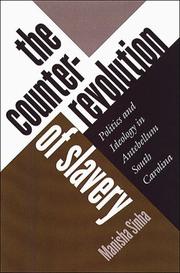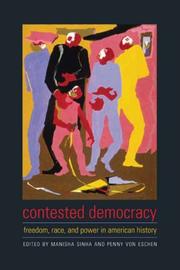| Listing 1 - 10 of 12 | << page >> |
Sort by
|
Book
ISBN: 9780300227116 Year: 2016 Publisher: New Haven London Yale University Press
Abstract | Keywords | Export | Availability | Bookmark
 Loading...
Loading...Choose an application
- Reference Manager
- EndNote
- RefWorks (Direct export to RefWorks)
Received historical wisdom casts abolitionists as bourgeois, mostly white reformers burdened by racial paternalism and economic conservatism. Manisha Sinha overturns this image, broadening her scope beyond the antebellum period usually associated with abolitionism and recasting it as a radical social movement in which men and women, black and white, free and enslaved found common ground in causes ranging from feminism and utopian socialism to anti-imperialism and efforts to defend the rights of labor. Drawing on extensive archival research, including newly discovered letters and pamphlets, Sinha documents the influence of the Haitian Revolution and the centrality of slave resistance in shaping the ideology and tactics of abolition. This book is a comprehensive history of the abolition movement in a transnational context. It illustrates how the abolitionist vision ultimately linked the slave's cause to the struggle to redefine American democracy and human rights across the globe.
Antislavery movements --- Abolitionists --- Slavery --- History. --- Political aspects --- Social reformers --- Abolition of slavery --- Antislavery --- Enslavement --- Mui tsai --- Ownership of slaves --- Servitude --- Slave keeping --- Slave system --- Slaveholding --- Thralldom --- Crimes against humanity --- Serfdom --- Slaveholders --- Slaves --- Abolitionism --- Anti-slavery movements --- Human rights movements --- Esclavage --- Abolitionnistes --- Histoire --- Abolition --- États-Unis --- United States --- History --- Histoire. --- Political aspects&delete& --- Slavery. --- Society. --- United States. --- Enslaved persons

ISBN: 0807825719 0807848840 0807860972 9798890872067 9780807860977 Year: 2000 Publisher: Chapel Hill : University of North Carolina Press,
Abstract | Keywords | Export | Availability | Bookmark
 Loading...
Loading...Choose an application
- Reference Manager
- EndNote
- RefWorks (Direct export to RefWorks)
In this comprehensive analysis of politics and ideology in antebellum South Carolina, Manisha Sinha offers a provocative new look at the roots of southern separatism and the causes of the Civil War. Challenging works that portray secession as a fight for white liberty, she argues instead that it was a conservative, antidemocratic movement to protect and perpetuate racial slavery.Sinha discusses some of the major sectional crises of the antebellum era--including nullification, the conflict over the expansion of slavery into western territories, and secession--and offers an important ree
Slavery --- Enslavers --- Secession --- Political culture --- Political aspects --- History --- Political activity. --- South Carolina --- Politics and government --- Slaveholders
Book
ISBN: 9780300182088 0300182082 9780300181371 030018137X Year: 2020 Publisher: New Haven, Connecticut : Yale University Press,
Abstract | Keywords | Export | Availability | Bookmark
 Loading...
Loading...Choose an application
- Reference Manager
- EndNote
- RefWorks (Direct export to RefWorks)
A groundbreaking history of abolition that recovers the largely forgotten role of African Americans in the long march toward emancipation from the American Revolution through the Civil War Received historical wisdom casts abolitionists as bourgeois, mostly white reformers burdened by racial paternalism and economic conservatism. Manisha Sinha overturns this image, broadening her scope beyond the antebellum period usually associated with abolitionism and recasting it as a radical social movement in which men and women, black and white, free and enslaved found common ground in causes ranging from feminism and utopian socialism to anti-imperialism and efforts to defend the rights of labor. Drawing on extensive archival research, including newly discovered letters and pamphlets, Sinha documents the influence of the Haitian Revolution and the centrality of slave resistance in shaping the ideology and tactics of abolition. This book is a comprehensive new history of the abolition movement in a transnational context. It illustrates how the abolitionist vision ultimately linked the slave's cause to the struggle to redefine American democracy and human rights across the globe.
Slavery --- Antislavery movements --- African American abolitionists --- Abolitionists, African American --- Afro-American abolitionists --- Abolitionists --- Abolitionism --- Anti-slavery movements --- Human rights movements --- History. --- Abolition of slavery --- Antislavery --- Enslavement --- Mui tsai --- Ownership of slaves --- Servitude --- Slave keeping --- Slave system --- Slaveholding --- Thralldom --- Crimes against humanity --- Serfdom --- Slaveholders --- Slaves --- Social reformers --- Political aspects --- Enslaved persons
Book
ISBN: 9780674064904 Year: 2012 Publisher: Cambridge, MA
Abstract | Keywords | Export | Availability | Bookmark
 Loading...
Loading...Choose an application
- Reference Manager
- EndNote
- RefWorks (Direct export to RefWorks)
Book
ISBN: 0674064909 0674069307 9780674069305 9780674064904 9780674064447 0674064445 Year: 2012 Publisher: Cambridge, Mass. Harvard University Press
Abstract | Keywords | Export | Availability | Bookmark
 Loading...
Loading...Choose an application
- Reference Manager
- EndNote
- RefWorks (Direct export to RefWorks)
The abolitionists of the mid-nineteenth century have long been painted in extremes--vilified as reckless zealots who provoked the catastrophic bloodletting of the Civil War, or praised as daring and courageous reformers who hastened the end of slavery. But Andrew Delbanco sees abolitionists in a different light, as the embodiment of a driving force in American history: the recurrent impulse of an adamant minority to rid the world of outrageous evil.Delbanco imparts to the reader a sense of what it meant to be a thoughtful citizen in nineteenth-century America, appalled by slavery yet aware of the fragility of the republic and the high cost of radical action. In this light, we can better understand why the fiery vision of the ";abolitionist imagination"; alarmed such contemporary witnesses as Herman Melville and Nathaniel Hawthorne even as they sympathized with the cause. The story of the abolitionists thus becomes both a stirring tale of moral fervor and a cautionary tale of ideological certitude. And it raises the question of when the demand for purifying action is cogent and honorable, and when it is fanatic and irresponsible. Delbanco's work is placed in conversation with responses from literary scholars and historians. These provocative essays bring the past into urgent dialogue with the present, dissecting the power and legacies of a determined movement to bring America's reality into conformity with American ideals.
Periodical
Publisher: Athens ; London The University of Georgia Press
Abstract | Keywords | Export | Availability | Bookmark
 Loading...
Loading...Choose an application
- Reference Manager
- EndNote
- RefWorks (Direct export to RefWorks)
Book
ISBN: 9780674064447 Year: 2012 Publisher: Cambridge, Mass. London Harvard University Press
Abstract | Keywords | Export | Availability | Bookmark
 Loading...
Loading...Choose an application
- Reference Manager
- EndNote
- RefWorks (Direct export to RefWorks)

ISBN: 0231141106 0231511981 1322592241 Year: 2007 Publisher: New York Columbia University Press
Abstract | Keywords | Export | Availability | Bookmark
 Loading...
Loading...Choose an application
- Reference Manager
- EndNote
- RefWorks (Direct export to RefWorks)
Book

ISBN: 2728809674 2728827826 Year: 2021 Publisher: Paris : Éditions Rue d’Ulm,
Abstract | Keywords | Export | Availability | Bookmark
 Loading...
Loading...Choose an application
- Reference Manager
- EndNote
- RefWorks (Direct export to RefWorks)
Détruire l’esclavage. Perspectives transnationales sur l’abolitionnisme américain (1776-1865) est un recueil de sept essais rédigés par des spécialistes français de l’abolition de l’esclavage aux États-Unis. Les auteurs placent l’abolitionnisme américain dans un contexte transnational et montrent comment des esclaves fuyant au Canada, des Noirs libres émigrant à Haïti et des activistes se retrouvant dans un salon parisien ont influencé, chacun à leur façon, le destin de l’esclavage aux États-Unis. Dans le prolongement de récentes tendances historiographiques, l’abolitionnisme y est abordé sur le temps long. Une attention particulière est également apportée à la culture imprimée abolitionniste - romans, journaux, livres-albums et almanachs antiesclavagistes, brochures et sermons rédigés par des activistes noirs. L’ouvrage est préfacé par Manisha Sinha, auteure d’un livre remarqué sur l’abolitionnisme aux États-Unis, The Slave’s Cause: A History of Abolition Undoing Slavery: American Abolitionism in Transnational Perspective (1776-1865) is a collection of seven essays by leading and emerging scholars of abolition in France. Contributors to the volume situate American abolitionism in a transnational framework, pointing out how slaves running away to Canada, free African Americans emigrating to Haiti and activists meeting in a Paris salon all influenced the fate of slavery in the United States. In the wake of recent historiographical trends, they extend not only the geography but also the chronology of abolitionism, attending to its development and evolutions over the longue durée. Special emphasis is also placed on the varied print culture of abolition, from antislavery novels, newspapers, gift books and almanacs to black-authored pamphlets and printed orations on the abolition of the slave trade. Undoing Slavery is prefaced by Manisha Sinha, author of the award-winning The Slave’s Cause: A History of Abolition.
Antislavery movements --- History --- Abolitionism --- Anti-slavery movements --- Slavery --- Human rights movements --- colonialism --- abolition of slavery --- anti-slavery --- essay --- slavery --- american abolitionism --- slaveries escape --- black activist
Book

ISBN: 9780231511988 Year: 2007 Publisher: New York, NY
Abstract | Keywords | Export | Availability | Bookmark
 Loading...
Loading...Choose an application
- Reference Manager
- EndNote
- RefWorks (Direct export to RefWorks)
| Listing 1 - 10 of 12 | << page >> |
Sort by
|

 Search
Search Feedback
Feedback About UniCat
About UniCat  Help
Help News
News